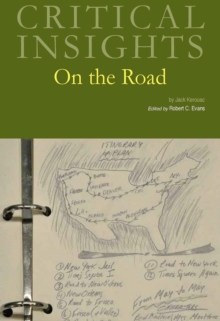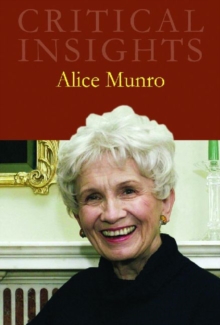
Hardback
- Information
Description
Emily Dickinson's poetry, letters, and life have astounded readers and scholars alike for more than one hundred years.
Though she rarely left her hometown of Amherst, Massachusetts, and in her later years never ventured beyond the fence encircling her family's home, Dickinson nevertheless wrote some of the world's most original, enigmatic, and expansive poems. And though she was certainly aware of her talent, she largely shunned publication, famously deriding it as "the Auction/ Of the Mind of Man -," and thus upon her death left it to her family to decide what to do with the nearly 1,800 poems she had hoarded in a locked dresser drawer.
By turns strangely intimate, witty, sardonic, ebullient, and frighteningly sublime, the poems have since fascinated generations of readers and generated endless speculation about the poet's mind and life. This volume in the Critical Insights series, edited and with an introduction by J.
Brooks Bouson, Professor of English at Loyola University in Chicago, brings together a variety of new and classic essays on Dickinson's life and work.
Bouson's introduction reviews the unique challenges Dickinson presents to readers as well as the current state of Dickinson criticism, while a new essay by Paris Review contributor Jascha Hoffman celebrates Dickinson's compressive powers.
A brief biography by Gerhard Brand then acquaints readers with the known details of the lives of Dickinson and her family and friends. For readers studying Dickinson for the first time, a quartet of essays offers an introduction to her life, work, and critical reception.
Elizabeth Petrino situates Dickinson within her historical and cultural context by exploring the influences of New England Puritanism, Romanticism, Transcendentalism, and the Civil War upon her work.
Beginning with nineteenth-century newspaper and magazine reviews and ending with more recent studies of the Dickinson manuscripts and current postmodernist, feminist, psychoanalytic, and cultural studies, Fred D.
White surveys the major trends in Dickinson criticism and points readers to especially helpful introductory texts.
Margaret H. Freeman offers a close reading of a group of Dickinson's poems to show how experiencing their sound patterns and syntax can inform our understanding of them, as well as how their structuring metaphors demonstrate Dickinson's mental schemata.
Finally, Matthew J. Bolton examines the trope of "the conscious corpse" in poems by Robert Browning, A.
E. Housman, and Dickinson. Eleven previously published essays are also collected in this volume, offering readers a variety of perspectives on Dickinson through the eyes of some of today's best Dickinson scholars.
Jane Donahue Eberwein, editor of An Emily Dickinson Encyclopedia, catalogs the efforts of Dickinson scholars to dismantle the pervasive image of Dickinson as an ahistorical, otherworldly mystic.
Helen Vendler, A. Kingsley Porter University Professor at Harvard University, explores Dickinson's relations to time and eternity through close readings of some of her best-known poems.
Jed Deppman demonstrates that Dickinson's poems represent her attempts to think through difficult and contradictory thoughts and invite their reader to join in her thought experiments.
Joanne Feit Diehl examines the power of Dickinson's poetry and her ambivalent relation with linguistic authority and immanence.
Suzanne Juhasz analyzes the thematic repetitions in Dickinson's poetics, arguing that they serve a creative and transformative purpose. Shira Wolosky considers reclusion in both Dickinson's life and her work, finding it rooted in the poet's conflicting desire both to protect herself from the world and to protest it.
Nancy Mayer engages Dickinson's "flood subject," immortality, to show how she continues to intrigue contemporary readers.
Patrick J. Keane studies Dickinson's complex relations with the natural world and the Christian heaven, concluding that, for her, the transient beauty of the earth is more precious and more human than the eternal, static beauty of heaven.
Christine Gerhardt offers an ecocritical reading of a group of poems to contend that Dickinson's poetry is linked to wider nineteenth-century debates about the environment and place.
Faith Barrett makes a comparative analysis of Dickinson and Walt Whitman as they respond to the Civil War through their poetry, and Sarah E.
Blackwood examines how Dickinson represents the disjunctions between one's internal and external lives. Finally, the volume's appendixes offer a section of useful reference resources:A chronology of the author's lifeA complete list of the author's works and their original dates of publicationA general bibliographyA detailed paragraph on the volume's editorNotes on the individual chapter authorsA subject index
Information
-
Out of Stock - We are unable to provide an estimated availability date for this product
- Format:Hardback
- Pages:412 pages
- Publisher:Salem Press Inc
- Publication Date:30/12/2010
- Category:
- ISBN:9781587656958
Information
-
Out of Stock - We are unable to provide an estimated availability date for this product
- Format:Hardback
- Pages:412 pages
- Publisher:Salem Press Inc
- Publication Date:30/12/2010
- Category:
- ISBN:9781587656958


